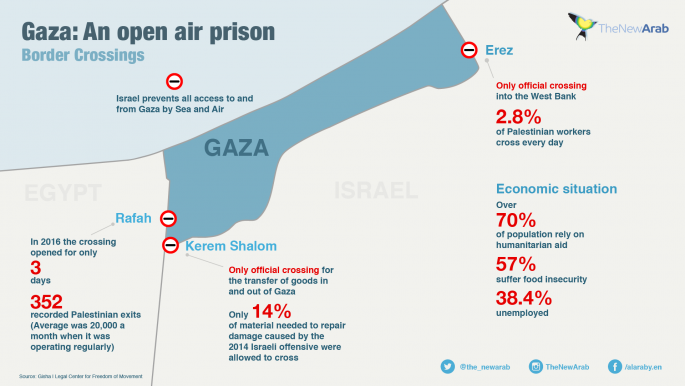Hamas-Israel uninterested in war, but it could happen anyway
Although it appears so far that neither side is interested in such an outcome, Israel's determination to destroy tunnels used by Palestinian groups to stage attacks across the border, following the alleged discovery of two "attack tunnels", carries significant risk.
For Israel, uncovering and destroying these tunnels is a top priority, for which no military or intelligence resources should be spared.
The priority becomes even more urgent for Israeli leaders, as the residents of Israeli settlements near Gaza have consistently voiced their concerns over the continuation of Hamas's military wing to excavate such tunnels, as Hamas commanders have confirmed on many occasions.
The Israeli settlers have often claimed they could hear construction and excavation noises underneath their homes.
 |
Israeli settlers have often claimed they could hear construction and excavation noises underneath their homes |  |
Although Israel has no strategic interest in a new full-scale confrontation with Hamas, he wrote on Saturday, both political and military leaders in Tel Aviv are well prepared to fight a new war to eliminate the "tunnel threat".
Hamas's dilemma
 |
| Israel carried out a number of strikes on Gaza [Anadolu] |
Meanwhile, Hamas faces a difficult dilemma, according to Ben-Yishai.
As Israel conducts operations into Gaza to locate and destroy their tunnels, should they use them immediately before losing their main strategic asset or should they avoid any operation, accept the idea that Israel will at least find some tunnels and instead look for other ways to surprise the Jewish state during the next war?
Hamas may not be ready for another round of fighting with Israel and the people of Gaza, always under a crippling Israeli-Egyptian blockade and cannot stand the pain and difficulties created by a new military operation in Gaza.
This could explain why Hamas responded to Israeli incursions into Gaza with limited mortar fire, in order to "deter" the army without causing a major conflagration.
 |
Making matters further complicated for Hamas is a recent claim by Israeli Prime Minister Binyamin Netanyahu that the army has the technology now to detect tunnels |  |
But making matters further complicated for Hamas is a recent claim by Israeli Prime Minister Binyamin Netanyahu that the army has the technology now to detect tunnels.
Some military analysts in Tel Aviv said this could increase tension and limit options for Hamas, possibly leading to a major escalation.
Alon Ben David, military affairs commentator, said the announcement reduced the "margin of manoeuvrability" for Hamas.
Hamas realises the detection of the tunnels recently was no accident, he wrote on Saturday in Maariv, and understands the discovery of the remainder of its tunnels was a matter of time.
As a result, Hamas could be forced to use the tunnels to carry out attacks leading to new war, he added.
Despite the blockade on Gaza, Hamas can inflict real damage on Israel, even more than the losses Israel suffered in 2014, thanks to accumulated new weapons and the tunnels.
A new war would also post a bigger threat to settlers near the Strip, who refuse to evacuate in the event of war as the army plans to do, according to Israeli radio on Thursday.
 |
Netanyahu has often been accused of basing his key decisions on internal political calculations |  |
Political calculations = war?
Although the Israeli prime minister is aware of all these risks, he seems determined to press ahead with anti-tunnel operations, not the least for political calculations.
Netanyahu has often been accused of basing his key decisions on internal political calculations.
Netanyahu, for one thing, could use a new escalation to dodge the criticism against his government and calls for his resignation from the far right, following the publication of an Israeli investigation into the 2014 war that exposed his performance.
Yet there are some in Israel who believe the situation could be contained by easing the blockade.
Israeli press claimed that a number of ministers in Tel Aviv want to hold a cabinet session to discuss the issue of allowing a port to be constructed in Gaza, with support from the army leadership.
This, Israeli press reports said, could give Hamas an achievement it would be keen on preserving, including by avoiding escalation.
At least four ministers support the idea – Israel Katz, Naftali Bennett, Yoav Galant and Avi Gabbay – and there are likely more, as long as there is a strict inspection regime in order to ensure that weapons and materials that can be used to increase Hamas's military strength are not smuggled into the Strip through the port.
However, Netanyahu and Defence Minister Moshe Yaalon are ignoring this opinion, according to the Jerusalem Post, just as they are ignoring the security echelon's recommendations to initiate a diplomatic process with the Palestinians.
 |
| [Click to enlarge] |
Quiet powder keg
Since Saturday, the situation quieted down in Gaza.
The Israeli army did not use tank fire, canons or airstrikes, and the Palestinian resistance did not respond with any mortar shells.
One of the reasons for Saturday's quiet were the messages that each side sent to the other publicly and through third parties, such as Egypt, reported the Post, in which they said that they have no interest in increasing tensions, and certainly no intention to go to war.
Hamas's prime minister in Gaza, Ismail Haniyeh, expressly stated this in his weekly sermon on Friday.
However, with the issue of the tunnels and more importantly the Israeli blockade and occupation in the rest of Palestine continuing to be unresolved, with both sides attempting to impose new red lines, an escalation may well be inevitable.





 Follow the Middle East's top stories in English at The New Arab on Google News
Follow the Middle East's top stories in English at The New Arab on Google News


